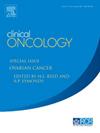Sexual Dysfunction in Prostate Cancer Patients According to Disease Stage and Treatment Modality
IF 3.2
3区 医学
Q2 ONCOLOGY
引用次数: 0
Abstract
Aims
To investigate physical and psychological sexual dysfunction (SD) in prostate cancer (PCa) patients, according to disease stage and treatment modality.
Materials and methods
Participants diagnosed with PCa completed an online survey reporting sexual side effects across 13 domains, the importance of sexual function, and their support needs. Disease stage and treatment data were collected to identify variations in experience. Results were analysed descriptively and with chi-squared significance testing.
Results
Six hundred fifty-four participants diagnosed with localised (66.1%), locally advanced (25.1%), and advanced (8.9%) PCa responded to the survey. Their disease management included radical prostatectomy (RP; 49.7%), radiotherapy (RT; 45.9%), and androgen deprivation therapy (ADT; 43.6%). More than 98% reported new-onset post-treatment sexual problems. The most common physical dysfunctions were erectile dysfunction (ED; 91.0%), ejaculatory disturbance (82.9%), and anatomical penile change (70.0%). The most common psychosexual dysfunctions were loss of sexual confidence (76.2%), loss of sex drive (67.1%), and loss of self-esteem (57.1%). Participants diagnosed with advanced disease were significantly more likely to report SD than participants with localised or locally advanced disease in 5 of 13 domains (p < .05). Participants whose treatment included a combination of RP, RT, and ADT were most likely to report SD in 7 of 13 domains. Overall, 78.3% of participants said sexual activity was important to them, with 61.8% placing sexual problems in their top three current concerns. Furthermore, 78.3% wanted to discuss sexual problems with a healthcare professional, with most wishing to focus on ED, loss of sexual confidence, and low libido.
Conclusion
SD is a common, wide-ranging, and distressing side effect of treatment, and PCa survivors place a high level of importance on sexual recovery. Those with advanced disease are among the worst affected and report high levels of psychosexual problems. Holistic rehabilitation strategies addressing a broad range of side effects would benefit all, but particularly those treated with permanent ADT.
前列腺癌患者性功能障碍的分期及治疗方式
目的探讨前列腺癌(PCa)患者的生理和心理性功能障碍(SD)情况,根据疾病分期和治疗方式进行分析。材料和方法被诊断为前列腺癌的参与者完成了一项在线调查,报告了13个领域的性副作用、性功能的重要性以及他们的支持需求。收集疾病分期和治疗数据,以确定经验的差异。结果进行描述性分析和卡方显著性检验。结果654名被诊断为局部PCa(66.1%)、局部晚期PCa(25.1%)和晚期PCa(8.9%)的参与者参与了调查。他们的治疗包括根治性前列腺切除术(RP;49.7%),放疗(RT;45.9%),雄激素剥夺疗法(ADT;43.6%)。超过98%的人报告了治疗后新出现的性问题。最常见的生理功能障碍是勃起功能障碍(ED);91.0%),射精障碍(82.9%)和阴茎解剖改变(70.0%)。最常见的性心理障碍是丧失性信心(76.2%)、丧失性欲(67.1%)和丧失自尊(57.1%)。在13个领域中的5个领域中,被诊断为晚期疾病的参与者比局部或局部晚期疾病的参与者更有可能报告SD (p <;. 05)。包括RP, RT和ADT联合治疗的参与者最有可能在13个领域中的7个报告SD。总体而言,78.3%的受访者表示性活动对他们很重要,61.8%的受访者将性问题列为他们目前最关心的三大问题之一。此外,78.3%的人希望与医疗保健专业人员讨论性问题,其中大多数人希望重点关注ED、性信心丧失和性欲低下。结论前列腺增生症是一种常见的、广泛的、令人痛苦的副作用,前列腺增生患者对性恢复的重视程度很高。那些患有晚期疾病的人是受影响最严重的,并报告了高水平的性心理问题。解决广泛副作用的整体康复策略将使所有人受益,特别是那些接受永久性ADT治疗的人。
本文章由计算机程序翻译,如有差异,请以英文原文为准。
求助全文
约1分钟内获得全文
求助全文
来源期刊

Clinical oncology
医学-肿瘤学
CiteScore
5.20
自引率
8.80%
发文量
332
审稿时长
40 days
期刊介绍:
Clinical Oncology is an International cancer journal covering all aspects of the clinical management of cancer patients, reflecting a multidisciplinary approach to therapy. Papers, editorials and reviews are published on all types of malignant disease embracing, pathology, diagnosis and treatment, including radiotherapy, chemotherapy, surgery, combined modality treatment and palliative care. Research and review papers covering epidemiology, radiobiology, radiation physics, tumour biology, and immunology are also published, together with letters to the editor, case reports and book reviews.
 求助内容:
求助内容: 应助结果提醒方式:
应助结果提醒方式:


